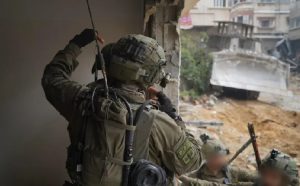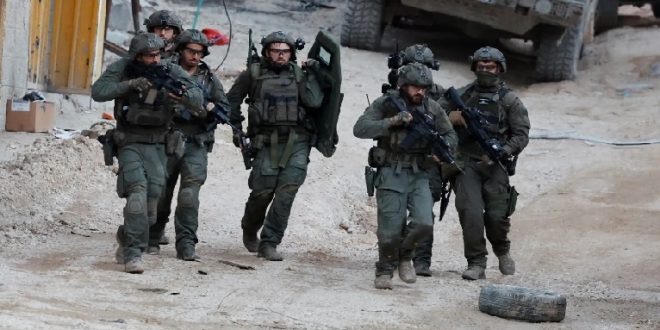25-10-2024
JERUSALEM: As someone who served four Israeli prime ministers and was deputy head of the country’s National Security Council, Eran Etzion’s judgement was trusted at the highest levels of the state.
A longstanding critic of Prime Minister Benjamin Netanyahu, he is also someone whose years of public service earned him widespread respect but now Etzion, a former soldier himself, is warning that Israel’s military, the Israel Defense Forces (IDF) might be committing war crimes in northern Gaza and he is suggesting that officers and troops should reject illegal orders.
 “They should refuse. If a soldier or an officer is expected to commit something that might be suspected as a war crime, they must refuse. That’s what I would do if I were a soldier. That’s what I think any Israeli soldier should do,” he tells me.
“They should refuse. If a soldier or an officer is expected to commit something that might be suspected as a war crime, they must refuse. That’s what I would do if I were a soldier. That’s what I think any Israeli soldier should do,” he tells me.
We are sitting on the balcony of his home in Shoresh in central Israel.
Here there is the quiet sunshine of an autumn morning. A peaceful neighborhood where some builders are working on house improvements.
Less than 40 miles down the road is the Gaza neighborhood of Jabalia.
As Etzion and I are speaking, doctors and medical staff at the Indonesian Hospital in Jabalia are sending desperate voice notes to the international community begging for aid.
One senior nurse, in a message heard by media speaks in an exhausted voice of relentless privations allegedly imposed by the Israelis besieging Jabalia.
“My friend, I’m so tired,” he says. “I can’t explain how tired I am. The water is empty. We don’t have water. We contacted the Israeli force to allow us to charge water to the tank, but they don’t accept that….and we don’t know what will happen tomorrow. The situation is very very bad.”
Another nurse says: “I am sorry for my language, I can’t talk well. I am very fatigued and dizzy. I haven’t eaten since yesterday. We try to give the food that we found to the patients and families and we don’t eat ourselves.”
Tens of thousands of people are now fleeing Jabalia as the Israeli army continues its offensive against what it says is an attempt by Hamas to regroup.
 Etzion is worried for the civilians of Jabalia and his country. “There is a very dangerous erosion of norms. There is a very widespread sense of revenge, of rage,” he says. This is because, Etzion says, Israel is in the grip of trauma after the 7 October 2023 Hamas attacks in which around 1,200 Israelis were killed and more than 200 taken hostage into Gaza.
Etzion is worried for the civilians of Jabalia and his country. “There is a very dangerous erosion of norms. There is a very widespread sense of revenge, of rage,” he says. This is because, Etzion says, Israel is in the grip of trauma after the 7 October 2023 Hamas attacks in which around 1,200 Israelis were killed and more than 200 taken hostage into Gaza.
“The will to revenge could be understood. It’s human, but we’re not a gang, we’re not a terror organization, and we’re not a militia. We’re a sovereign country. We have our history, we have our morals, we have our values, and we must operate under international law and under international standards if we want to continue to be a member of the international community, which we do.”
He is speaking out as a former soldier, as someone whose children served in the IDF, and whose family and friends still serve. “I’m just a concerned citizen trying to raise my voice. So that’s what I’m doing. I want to make sure that no soldier is involved in anything that could be constituted as a war crime.”
Israel has faced mounting international criticism over its conduct during the war. The United States has threatened to cut arms shipments if Israel does not surge aid into Gaza. The UN has accused the Israelis of repeatedly blocking or impeding the transfer of aid, most recently into northern Gaza. The IDF has consistently rejected allegations that it is implementing a deliberate policy of starvation to force residents to flee from Jabalia. Israel has long accused Hamas of using the civilian population as human shields, launching attacks from schools and medical facilities. (Int’l News Desk)
 Pressmediaofindia
Pressmediaofindia




